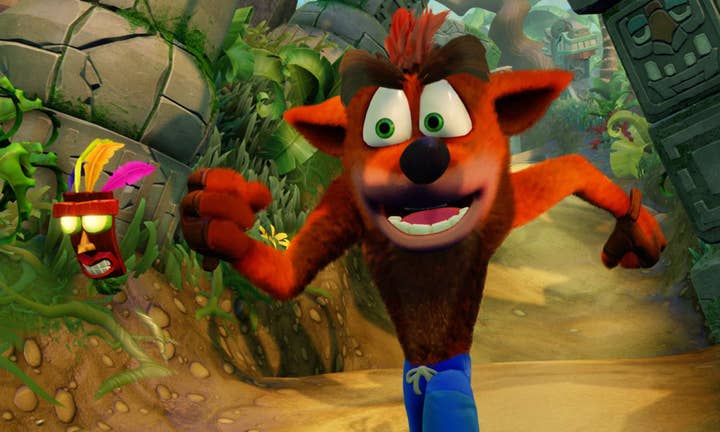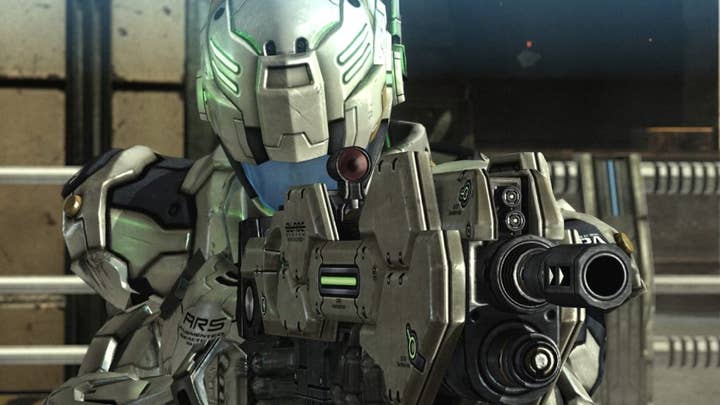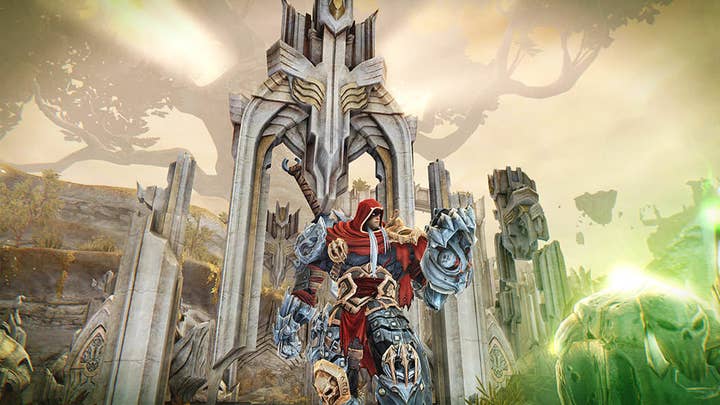Video game remasters are a win-win for publishers
With low costs and strong interest from players, it's easy to see why the remastering trend is catching on
Have you noticed how many remastered video games have been released lately?
Remastering music and film for newer formats has been standard practice in those industries for some time, and the games industry now has enough history behind it to mine older titles and bring them to either nostalgic audiences or players who are experiencing a classic IP afresh.
Given a market in which so many publishers are highly risk averse and costs are typically astronomical, it's easy to see why the relatively low costs of remastering are so appealing. With consumers hungry for classic content, especially during this nostalgia wave we're witnessing, it makes perfect sense for publishers to capitalize.
"Crash has surpassed all of our expectations by a pretty wide margin"
Eric Hirshberg, Activision Publishing
Looking at the UK charts, remasters of Mario Kart, Wipeout, Crash Bandicoot and Final Fantasy XII have all topped the charts in the last two months. And in the US, NPD told us that remastered/ported games have accounted for 11% of total dollar spending life-to-date for physical game sales on PS4 and Xbox One. Nearly 80 remastered/ported games have been released for PS4 or Xbox One (or both) since November 2013, representing about 15% of all titles released at retail for those consoles.
Recently, during Activision Blizzard's earnings call, Activision Publishing boss Eric Hirshberg gushed over the success of Crash Bandicoot.
"We knew that there was a passionate audience out there for Crash.... but we had no idea - it's hard to tell whether that's a vocal minority or whether that's a real mass audience until you put something out there. And Crash has surpassed all of our expectations by a pretty wide margin," he said.
"And a couple of stats that underscore that point where it was the number one selling console game in June based on units, even though it was only available for two days during that month. And Sony reported this morning... that Crash is the most downloaded game on the PlayStation Store in July."

Activision has enjoyed the fruits of remastering before with Modern Warfare Remastered, but you can bet it will look at more easy wins in this category moving forward. In fact, Activision's counterpart, Blizzard, is planning on releasing a remastered StarCraft in the third fiscal quarter.
"This is a strategy that clearly has our attention... I think you can be confident that there will be more activity like this in the future with more great IP," Hirshberg added.
As NPD analyst Mat Piscatella noted, publishers are able to offset some of the inherent risk in AAA development by pursuing the remastering trend.
"Hardware moves on, so a lot depends on how the original assets are archived and whether they can be brought up to date"
Rowan Tafler, Sega Searchlight
"On average, remasters/ports sell less than games that are new to the platform, unsurprisingly," he said. "However, given the dramatically lower development costs when compared to new game development, the ability to outsource porting to speciality houses which frees up internal development resources to create new games, and the ability to mitigate risk since a clear demand pattern exists to determine which games should be remastered, the benefits of the practice are readily apparent to publishers."
Publishers we queried wouldn't state exact costs, but it's clearly something that can vary on a case-by-case basis. A much older title would likely need new artwork, whereas something closer to the current generation may only need a touch up with textures or polygons.
THQ Nordic, which has remastered properties like Darksiders, De Blob, Baja: Edge of Control and others, weighed in. "Age plays an important role here and if all the data is complete and accessible," said director of production, Reinhard Pollice. "Also some projects are already set up in a way that they are perfectly fit for more advanced platforms than they were originally targeting. In general remastering pays off if you do it the right way."
Sega, too, has had its share of remastering, especially for the PC with titles like Bayonetta and Vanquish. Rowan Tafler, head of brand for Sega Searchlight, the internal team at Sega Europe that oversees PC conversions, commented, "It's not always a simple process, especially bringing classic titles to PC. With console development, you have reasonably fixed hardware standards - on PC, we need to ensure that the game runs well on a wide range of specifications and that can be a difficult process. Hardware moves on, so a lot depends on how the original assets are archived and whether they can be brought up to date.

"Of course, we need to make sure that development is profitable - that gives us the opportunity to keep doing what we're doing - but the satisfaction really comes from doing right by our community and our catalogue."
Satisfying the community is certainly a key goal in remastering, and listening to players' desires is a helpful way to identify which games should get a modern makeover.
"I think that remastering comes from perpetual and existing interest in a property or brand," said Tafler. "We're not going to be able to reignite interest in something if the quality isn't there in the first place. That wouldn't be a good business decision.
"Sometimes we believe also in titles that weren't that popular in the first place, but we feel they deserve a chance"
Reinhard Pollice, THQ Nordic
"Does it increase interest and give players who potentially haven't experienced the titles before an opportunity to play a title in its optimum form? Yes, absolutely. But we don't perform a best practice conversion with the intent of piling all the profit into making a new game in the series or using the IP. That sort of decision would be made completely separately."
THQ Nordic doesn't always look at popularity, however. "Sometimes we believe also in titles that weren't that popular in the first place, but we feel they deserve a chance," Pollice noted.
He added that oftentimes there's a belief that an old property that didn't make a big splash can have a new lease of life as a remaster, or that a classic can gain legions of new fans who were just too young to have experienced it years ago. In a sense, by remastering a game, you've got built-in marketing for that franchise, which may one day lead to new entries for a series.
"That's actually our very original thought about remastering a title," Pollice continued. "We want to make first-hand experiences with the audience and a game's fan base and understand their wishes and demands. We are fans ourselves of our own franchises but it's always good to stay in touch with the community and listen."
Remastering might seem like a cakewalk, but with 4K gaming starting to take hold on consoles, and with PC gamers already accustomed to extra high fidelity visuals, there are more challenges involved in revamping a particular title than you might guess.

"Sometimes it's a technical challenge to make it look and feel like a recent game," Pollice acknowledged. "Within these two fields there are tons of tiny challenges. For example, on Darksiders Warmastered Edition the biggest challenge was to remaster the cutscene. In Darksiders 1 the cutscenes were pre-rendered - even the original developers thought we are crazy to go into that.
"First of all, the data to render the cutscenes weren't complete. So we had to re-create some pieces and puzzle them together as good as possible (actually there are a few tiny differences that are not really a big deal but they are there). Then the cutscenes used a very specific rendering set-up, sometimes custom-made for a given scene or even shot so that it looks cool. In the end it was a huge time-sink but we got those re-mastered - even in 4k on some platforms."
"As technology continues to evolve, I believe remasters and ports will only become more prevalent for the short to mid-term"
Mat Piscatella, NPD
Sega has gone through similar experiences with its projects. Tafler commented, "Our recent challenges have revolved around porting popular console games from the last 10 years - Valkyria Chronicles, Vanquish and Bayonetta for example - to PC. The format change and the expectation from PC gamers for these titles to be properly optimised for PCs presents our biggest challenge. Can we make run it with unlocked framerates? Can we implement fully optimised PC controls? Can we make it run at 4K? Can we deliver the best experience on a wide range of hardware?
"If the answer to all these questions is yes, then the project has potential. Ultimately, we want the communities playing these games to be able to have the best possible experience playing them."
The benefits clearly outweigh any difficulties encountered for most companies. Remastering is here to stay. "As technology continues to evolve, I believe remasters and ports will only become more prevalent for the short to mid-term," said NPD's Piscatella. "First, we have creators making stories and characters that will continue to resonate. Allowing these characters to come to life through technological improvements is something that will continue to find an audience.
"Second, development of new game content is only going to get more expensive due to the higher fidelity technologies like 4K. Mitigating risk of new game development via releasing remasters/ports at low cost will continue to be attractive to publishers.
"Finally, franchises are more important than ever. Remasters/ports allow publishers to reintroduce characters and storylines before the release of a new game in a series, or allow new people to experience the full backstory without being forced to go to old console tech."
He added, "In the long-term, the only risk to this remaster-friendly future is the advent of the Games as a Service model. I'm not sure what a remastered version of a live service game would look like, or if it would even be the least bit palatable to consumers.
"I believe we'll get more of these games, that more dev houses will focus on this type of work as a speciality, and that consumers will continue to show a willingness to support quality remasters/ports."








